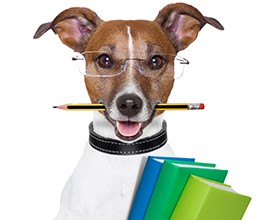By guest author Marie Poliseno, CPA and managing partner of Dollars & Scents Accounting Services
 Too often, self-employed professional dog walkers find themselves owing taxes at the end of the year, in part because they weren’t aware of things they could or should have done during the year to avoid a tax bill. This includes understanding tax deductions that are appropriate for a dog walking business.
Too often, self-employed professional dog walkers find themselves owing taxes at the end of the year, in part because they weren’t aware of things they could or should have done during the year to avoid a tax bill. This includes understanding tax deductions that are appropriate for a dog walking business.
First and foremost, planning is key: Don’t just get handed a tax bill at the end of the year. Learn advantageous ways to manage it. Make sure you are tracking your income and expenses accurately, and don’t be afraid to ask questions.
Too often clients fail to engage in a dialogue with their tax preparer. A good CPA who understands your industry will take initiative, but it never hurts to ask about tax strategies that could lower your tax bill, including allowable deductions you may be leaving on the table.
Where to Start
The first step is setting up a separate business bank account from your personal one. Once you’ve committed to a discipline of depositing all of your business income and paying business expenses from your business account, you’ve gone a long way toward helping yourself understand your financial picture and the taxes you’ll owe.
The second step is learning to properly categorize your revenue and expenses to determine their tax deductibility. There are various ways to get help with this step, including engaging a CPA knowledgeable about your industry, attending tax related webinars, or doing some research on your own.
Next, engage in a dialogue with a tax professional to answer some essential questions, such as:
- Are there any tax advantages to purchasing certain assets for my business, like a car or an SUV? Does one type of vehicle have a tax advantage over another?
- I am planning to invest in my business this year, including purchasing a new computer and software to manage my scheduling of dog walking and invoicing. How will this affect my tax bill?
- I am planning to attend a conference this year or enroll in an education or certification program away from home. What expenses can I deduct while traveling to and from these events?
- Are there any tax strategies I should be employing to lower my bill?
Don’t be afraid to ask questions. You know your business better than anyone, so if something is on your mind, speak up! Your tax preparation should not just consist of handing over some files or receipts to an accountant once a year. Having a consistent dialogue with your CPA throughout the year helps lay out a plan for managing your taxes and provides an opportunity to do something about them proactively. This will often save you money and unpleasant surprises, like owing more than you’ve budgeted for.
Often-Overlooked Tax Deductions
I see too many clients paying more taxes than necessary simply because they didn’t know they could take certain kinds of deductions. Here are some of the most commonly missed ones:
The Home Office Deduction. Did you know that a portion of your home or apartment used exclusively for your business is tax deductible? Your home office space is the most obvious candidate. And if you provide boarding or daycare in your home, which is often the case—because as your clients’ dog walker, you are probably the first person they will approach to provide this service—the space you use for crating the dogs in your care could also be considered when calculating the square footage of your home used for business. Think about not only the additional revenue source but the tax advantages of deductions associated with it, like the laundry, pet food costs, and other supplies. Translation: tax savings!
Business Use of Your Vehicle. Especially for dog walkers who spend a lot of their time traveling to, picking up, and dropping off clients’ dogs, getting the best possible deduction for the use of your vehicle can save tax dollars big time. Many people believe the mileage deduction is always the most advantageous way to deduct the business use of their vehicle, but this isn’t always true. Often times, especially with new vehicles, the depreciation deduction far outweighs the mileage calculation. It’s worth asking your accountant which strategy is best given your vehicle and how it’s used.
Meals While Away From Home. This is often a topic of conversation because most dog walkers work in close proximity to their homes. In those cases, meals while out and about during the work day are NOT tax deductible. However, if your dog walking takes you more than 20 miles from home, the cost of your meals could be tax deductible.
Conference and Workshop Expenses. While most people realize the cost of enrollment in a conference or class is a business expense, many dog walkers overlook costs while attending such events. For example, you can deduct meals, the cost of travel to/from the workshop including car expenses (mileage or gas), parking, tolls, and lodging (even if it’s an RV park!), and any other expenses directly related to the activity.
Communication is the Key
The rules around deductions change often—another reason to keep that dialogue going with your accountant. Knowing about tax law changes can help you make good decisions about a range of things, including when to purchase something, what to buy, and how to purchase it. Should you buy a new or used car? This year or next? How much should you spend on it? Should you own it or should the business? Your tax professional can also guide you in decisions about the use of your space, or even which expenses to keep track of.
In short, maintaining an active relationship with a CPA and keeping up on tax laws can keep more money in your pocket at tax time. Who doesn’t like that?
Marie Poliseno is the managing partner of Dollars & Scents Accounting Services. She is a certified public accountant (CPA) as well as a professional dog trainer (CPDT-KA) and honors graduate of the SFSPCA Academy for Dog Trainers (CC). To work with Marie on your financial and tax matters, email [email protected], or visit www.dog-pro-cpa.com to learn more about her services.


